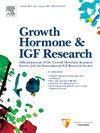Impact of disease activity on cognitive and psychological outcomes in acromegaly: A prospective study
IF 1.6
4区 医学
Q4 CELL BIOLOGY
引用次数: 0
Abstract
Purpose
To investigate the cognitive and psychological aspects of acromegaly and to assess how disease activity may affect these outcomes.
Methods
This prospective study included patients with acromegaly who consecutively admitted to Pituitary Center between June 2021 and July 2023. Cognitive functions were assessed using a series of standardized tests targeting memory, attention, executive function, verbal fluency, and visuospatial skills. Additionally, Beck Depression Inventory (BDI), Beck Anxiety Inventory, and Acromegaly Quality of Life Questionnaire (AcroQoL) assessments were conducted. These evaluations were performed preoperatively and at the 9th month postoperatively following transsphenoidal surgery (TSS) to assess the anticipated changes in neuropsychological functions based on disease activity.
Results
A total of 19 patients with acromegaly were included. Remission was achieved through TSS alone in 9 patients, while 10 patients required postoperative somatostatin receptor ligands. Cognitive functions (Montreal Cognitive Assessment Test) were better in the remission phase compared to the initial active disease phase (23.36 ± 3.46 vs 24.93 ± 3.73; p = 0.035). Cognitive flexibility and selective attention (Stroop Test) were impaired during the active period of the disease (17.79 ± 12.31 vs 12.29 ± 8.23; p = 0.016). Memory functions (Wechsler Memory Scale-Logical Memory Test: immediate recall, delayed recall, recognition) showed improvement from the active phase to remission (p = 0.016, p = 0.003, p = 0.008; respectively). BDI scores were significantly higher in the active phase compared to remission (7.36 ± 3.48 vs 5.43 ± 3.03; p = 0.009). Additionally, AcroQoL scores were lower during the active disease phase than in the remission phase (65.30 ± 17.75 vs 80.43 ± 13.61; p = 0.007).
Conclusion
Acromegaly may impair cognitive and psychological functions, which appear to improve with effective treatment.
肢端肥大症患者疾病活动对认知和心理结果的影响:一项前瞻性研究
目的探讨肢端肥大症的认知和心理方面的问题,并评估疾病活动如何影响这些结果。方法本前瞻性研究纳入2021年6月至2023年7月期间连续入住垂体中心的肢端肥大症患者。认知功能通过一系列针对记忆、注意力、执行功能、语言流畅性和视觉空间技能的标准化测试来评估。此外,进行贝克抑郁量表(BDI)、贝克焦虑量表(Beck Anxiety Inventory)和肢端肥大症生活质量问卷(AcroQoL)评估。这些评估在术前和经蝶窦手术(TSS)后9个月进行,以评估基于疾病活动的神经心理功能的预期变化。结果共纳入肢端肥大症患者19例。9例患者仅通过TSS获得缓解,10例患者术后需要使用生长抑素受体配体。认知功能(蒙特利尔认知评估测验)在缓解期优于初始活动性疾病期(23.36±3.46 vs 24.93±3.73;p = 0.035)。认知灵活性和选择性注意(Stroop Test)在疾病活动期受到损害(17.79±12.31 vs 12.29±8.23;p = 0.016)。记忆功能(韦氏记忆量表-逻辑记忆测试:即时回忆、延迟回忆、识别)从活跃阶段到缓解阶段均有改善(p = 0.016, p = 0.003, p = 0.008;分别)。活动期BDI评分明显高于缓解期(7.36±3.48 vs 5.43±3.03;p = 0.009)。此外,活动性疾病期的AcroQoL评分低于缓解期(65.30±17.75 vs 80.43±13.61;p = 0.007)。结论肢端肥大症可损害患者的认知和心理功能,经有效治疗可改善其认知和心理功能。
本文章由计算机程序翻译,如有差异,请以英文原文为准。
求助全文
约1分钟内获得全文
求助全文
来源期刊

Growth Hormone & Igf Research
医学-内分泌学与代谢
CiteScore
3.30
自引率
0.00%
发文量
38
审稿时长
57 days
期刊介绍:
Growth Hormone & IGF Research is a forum for research on the regulation of growth and metabolism in humans, animals, tissues and cells. It publishes articles on all aspects of growth-promoting and growth-inhibiting hormones and factors, with particular emphasis on insulin-like growth factors (IGFs) and growth hormone. This reflects the increasing importance of growth hormone and IGFs in clinical medicine and in the treatment of diseases.
 求助内容:
求助内容: 应助结果提醒方式:
应助结果提醒方式:


